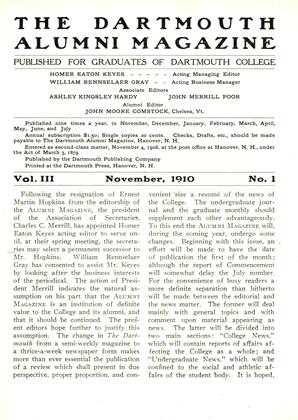Professor Frank H. Dixon has, within the past month, received appointment as chief statistician of the Bureau of Railway Economics now in process of establishment at Washington through the co-operation of the leading railways of the country. The object of this bureau is the accumulation and classification of information relative to railway operation and management, to the end of enabling the public to obtain full and accurate data in all such matters. The apparently conflicting interests of the railroads, on the one hand, and the general public, on the other, present one of the most difficult problems which the country faces today. It is apparently the belief of the railroads that the impartial and scientific study of the facts in the case may" serve to allay popular prejudice and assist in rendering the problem soluble. The bureau which they are establishing is, however, not one of special pleading and publicity, but of careful investigation whose results will be available to those who inquire for them. That such a bureau should achieve its function, public confidence in the integrity and ability of the man in charge of its work is absolutely essential. The choice of Professor Dixon is accordingly a high tribute to his qualities both as a student and as a man.
Professor Dixon graduated from the University of Michigan in 1892, and received his Ph.D. at the same institution in 1895, his thesis being on "State. Railroad Control in lowa." After a year's study at Berlin University, he returned to Michigan as instructor in History. The following year he was acting assistant professor of Economics. In 1898 he came to Dartmouth as assistant professor of Economics. His ability as an organizer was demonstrated when, on the establishment of the Tuck School in 1900, he was-made its secretary and outlined a curriculum and established a policy that have furnished a model for subsequent schools at Harvard and elsewhere. He gave up the secretaryship of the Tuck School in 1903, and in the same year became head of the Department of Economics in the College.
From the beginning of his graduate work at Michigan he has made a special study of railroad organization and management, and through his numerous writings has gained a reputation as an authority on the subject. Articles by him have appeared in the Quarterly Journal of Economics, Political Science Quarterly, Yale Review, and Atlantic Monthly. He has frequently been called upon for expert service to the National Government: several times in connection with the Census Bureau; in 1907-08 by the Interstate Commerce Commission to whom he rendered an exhaustive report on "Inter-corporate Relation of Railways in the United states and in the summer of 1909 by the National Waterways Commission, at whose behest he prepared a "Traffic History of the Mississippi River System." From time to time he has acted as consulting expert in questions of taxation in New Hampshire, For the past four years he has been a member of the executive committee of the American Economic Association.
It is fortunate that Professor Dixon's new duties do not compel him to sever his connection with Dartmouth. During the present semester he will necessarily be absent in Washington arranging and organizing the work of the bureau. After that he will spend at least half his time in Hanover, and will continue to conduct his regular College courses.
 View Full Issue
View Full Issue
More From This Issue
-
 Article
ArticlePRESIDENT NICHOLS' ADDRESS AT THE OPENING OF COLLEGE
November 1910 -
 Article
ArticleFollowing the resignation of Ernest Martins Hopkins
November 1910 -
 Article
ArticleFaculty Changes
November 1910 -
 Article
ArticleTHE DARTMOUTH CLUB OF BOSTON*
November 1910 -
 Class Notes
Class NotesLOCAL ASSOCIATIONS
November 1910 -
 Class Notes
Class NotesCLASS OF 1845
November 1910








